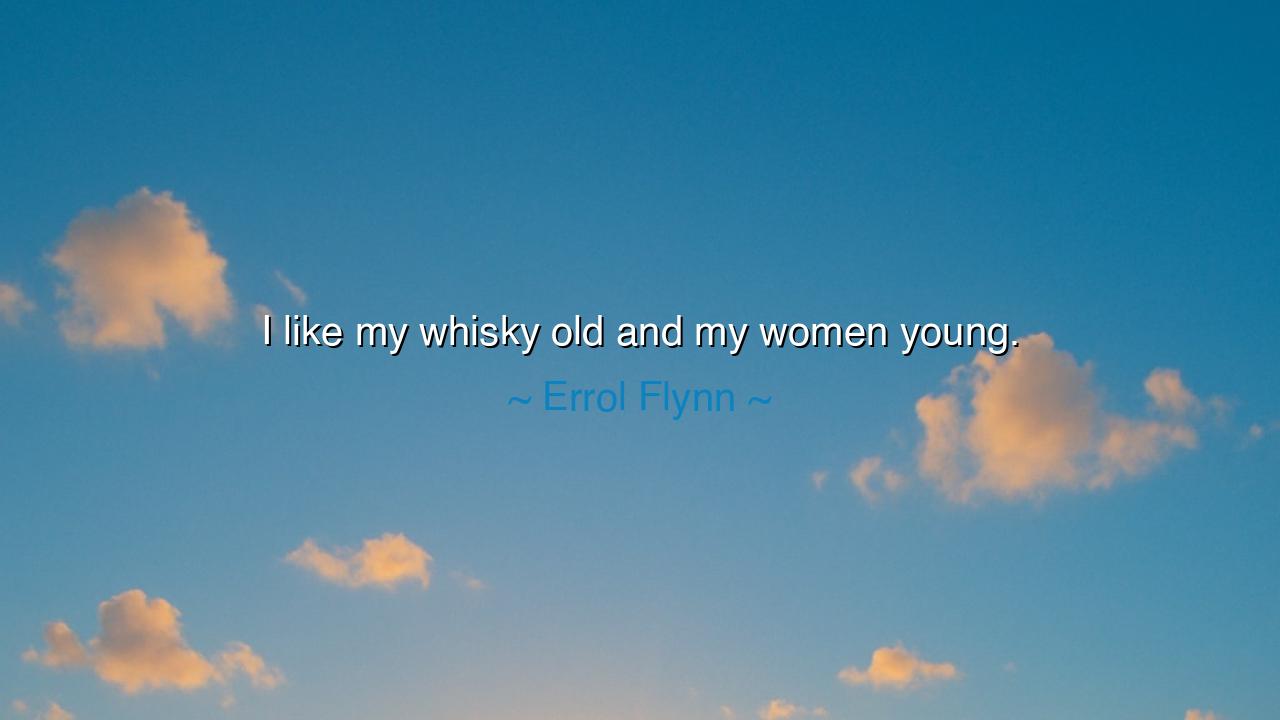
I like my whisky old and my women young.






Hear the bold and scandalous words of Errol Flynn, the swashbuckling actor of Hollywood’s golden age: “I like my whisky old and my women young.” At first hearing, these words carry the charm of wit and the sting of controversy. They are the confession of a man who lived recklessly, with appetite and abandon, chasing both the pleasures of the tavern and the fleeting bloom of youth. Yet beneath their mischief lies a reflection on human desire, on the longing for things that age well and things that fade quickly, and the tragedy of a soul that confuses indulgence with fulfillment.
The origin of this quote rests in Flynn’s own life, a man famed for roles as pirates, adventurers, and heroes, yet infamous for excess and scandal. Known for his love of drink and his pursuits of romance, he embodied the restless spirit of one who sought to escape the ordinary. In speaking of old whisky and young women, he revealed the paradox of his nature: he desired that which time perfected in the bottle, and that which time had not yet touched in the flesh. His words reveal the hunger of a man who loved pleasure, but also the danger of living for appetite alone.
History gives us many such figures. Recall Alcibiades, the brilliant yet reckless Athenian statesman. Gifted in charm, eloquence, and beauty, he was adored by the people and desired by women. Yet his unrestrained pursuit of pleasure and ambition brought ruin not only upon himself but upon Athens in its time of war. Like Flynn, Alcibiades was both admired and condemned, a man whose brilliance was eclipsed by his own appetites. Their lives remind us that unchecked indulgence, however dazzling in the moment, leaves shadows in its wake.
Flynn’s saying also speaks to a broader truth about human longing. We often seek in material things—like aged whisky—the richness of time, refinement, and permanence. Yet in relationships, too often, the world teaches men to crave only what is fresh, untested, and fleeting. This tension reveals a deeper flaw: the tendency to value permanence in possessions but transience in people. To live this way is to rob oneself of the deeper joys that come not from indulgence, but from enduring love, respect, and shared growth.
Yet, let us not dismiss Flynn’s words as mere folly. They serve as a mirror, showing us the dangers of living without discipline, of chasing only pleasure. In his honesty—however crude—there is a lesson for us. Better to face our desires openly than to hide them beneath masks of virtue. But once faced, those desires must be refined, lest they enslave us. The true art of life is not in denying pleasure altogether, but in tempering it, in seeking what endures rather than what vanishes with the passing of days.
The lesson we may draw is this: do not live for indulgence alone, for it leaves the heart empty. Seek the richness of things that grow finer with time—not only whisky, but wisdom, friendship, and love. Youth, though beautiful, is not the only light. Age, though less adorned, carries treasures of depth and experience. To fix one’s desires only upon what fades is to miss the greater gifts of life.
Practically, this means choosing balance. Enjoy the pleasures of the world, but do not be mastered by them. Value companionship not for youth alone, but for spirit, courage, and wisdom. Treasure those who grow with you, even as you yourself change. Seek refinement in character as much as in drink, and let your desires serve as sparks for growth rather than chains of weakness.
So let Flynn’s words, bold though they be, serve not only as scandal but as caution. “I like my whisky old and my women young” is the cry of a man who lived for the moment but paid dearly for it in the end. Let us, then, learn to pursue not only what delights the senses, but what nourishes the soul. For only then shall we live not as slaves of desire, but as masters of a life both joyful and enduring.






HN30.Nguyen Thi Hanh Nhung
When Errol Flynn says this, it’s clear he’s playing into the stereotype of the ‘charming rogue’—but I can't help but feel uncomfortable about how this quote reduces both whisky and women to mere objects to be consumed. Is there a deeper issue here regarding respect and objectification, or is this just a product of its time? How do we respond to statements like this today?
TPThuy Pham
This quote seems to echo a bygone era where masculinity and indulgence were often portrayed in such stark, almost crude terms. I wonder, though, if Flynn had any understanding of the underlying implications of such a statement. Does this remark reveal something about how society viewed women and aging back in his day? How does this quote make us reflect on the values of the time?
LLinh
I can't help but think how this quote reveals a certain aspect of Errol Flynn’s persona. On one hand, it’s playful and reflects a time when celebrities were expected to have exaggerated, colorful personalities. But on the other hand, is this kind of statement reinforcing harmful stereotypes about age and women’s worth? Does the quote glorify youth and reinforce unhealthy gender norms?
PMPhuong My
This quote seems to reflect a certain old-school charm and bravado, but at the same time, it raises uncomfortable questions about objectification and ageism. Is this just a lighthearted remark, or does it reveal deeper societal expectations about aging, gender, and relationships? Should we still celebrate such attitudes, or have we moved past these outdated views?